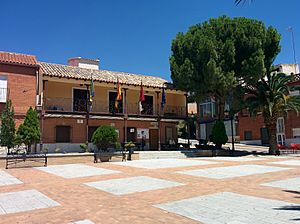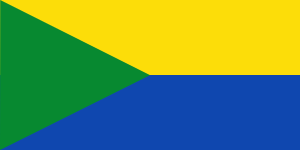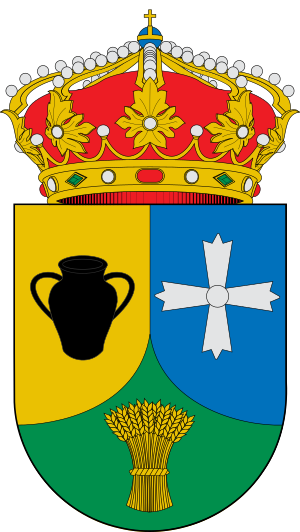Pantoja, Spain facts for kids
Pantoja is a charming village located in the heart of Spain. It's part of the province of Toledo, which is in the region called Castile-La Mancha. This small community is known for its quiet life and connection to Spanish traditions.
Contents
Discovering Pantoja
Pantoja is a small but interesting village in Spain. It is found in the central part of the country. The village is part of the province of Toledo. This province is famous for its history and beautiful landscapes. Pantoja is also within the Castile-La Mancha region. This region is known for its wide plains and traditional Spanish culture.
Where is Pantoja Located?
Pantoja is situated in a flat area. This makes the land good for farming. The village is not far from bigger cities. This allows residents to enjoy both quiet village life and access to city services. Its location in central Spain means it has a typical Mediterranean climate. Summers are warm and dry, while winters are mild.
A Look at Pantoja's Past
The history of Pantoja goes back a long time. Like many villages in this region, it has roots in ancient times. The area was likely settled by different groups throughout history. These included Romans and later, people from the Islamic world. Their influence can sometimes be seen in local traditions.
Medieval Times
During the Middle Ages, Pantoja became part of the Kingdom of Castile. This was a powerful kingdom in Spain. Villages like Pantoja played an important role. They provided food and resources for the larger towns. Life was often centered around farming and community.
Modern History
Over the centuries, Pantoja remained a small agricultural village. It adapted to changes in Spain. Today, it keeps its traditional charm. At the same time, it has modern services for its residents. The village continues to be a peaceful place to live.
Life in Pantoja Today
Life in Pantoja is calm and community-focused. Many residents work in agriculture. Others commute to nearby towns for jobs. The village has essential services like schools and shops. These help meet the daily needs of the people.
Local Culture and Traditions
Pantoja celebrates several local festivals each year. These events are important for the community. They often involve religious processions, music, and traditional food. These festivals bring people together. They help keep the village's unique culture alive.
Economy of the Village
The economy of Pantoja is still largely based on farming. Crops like cereals and olives are common. Some small businesses also operate in the village. These include local shops and services. Tourism is not a major industry here. However, visitors can enjoy the quiet atmosphere.
How Pantoja is Governed
Pantoja, like all Spanish municipalities, has its own local government. This government is called the Ayuntamiento. It is led by a mayor and a group of council members. These officials are elected by the people of Pantoja.
The Role of the Mayor
The mayor is the head of the local government. They are responsible for managing the village's services. This includes things like public works and local events. The mayor works to improve the quality of life for everyone in Pantoja. They also represent the village to higher levels of government.
Village Council
The village council works with the mayor. Council members help make decisions about the village. They discuss local issues and create policies. These policies affect daily life in Pantoja. The council ensures that the village runs smoothly. They also make sure that the needs of the community are met.
See also
 In Spanish: Pantoja (Toledo) para niños
In Spanish: Pantoja (Toledo) para niños
 | Mary Eliza Mahoney |
 | Susie King Taylor |
 | Ida Gray |
 | Eliza Ann Grier |




